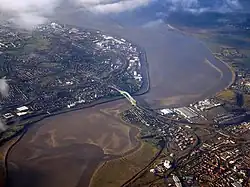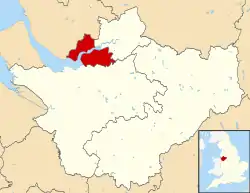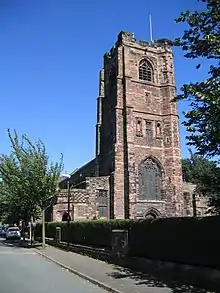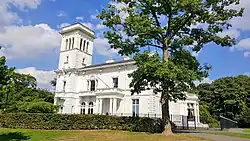Borough of Halton
Halton (/hɒltən/) is a unitary authority district with borough status in Cheshire, North West England. It was created in 1974 as a district of the non-metropolitan county of Cheshire, and became a unitary authority area on 1 April 1998 under Halton Borough Council.[8] Since 2014, it has been a member of the Liverpool City Region Combined Authority. The borough consists of the towns of Runcorn and Widnes and the civil parishes of Daresbury, Hale, Halebank, Moore, Preston Brook, and Sandymoor.[9] The district borders Merseyside, the Borough of Warrington and Cheshire West and Chester.
Halton | |
|---|---|
 | |
| Motto(s): Latin: Industria Navem Implet ("Industry fills the ship") | |
 Halton shown within Cheshire | |
| Coordinates: 53°20′42″N 02°44′19″W | |
| Sovereign state | United Kingdom |
| Country | England |
| Region | North West England |
| City region | Liverpool |
| Ceremonial counties | Cheshire |
| Historic counties |
|
| Settled | 10th century |
| Incorporated | 1974 |
| Unitary authority | 1998 |
| Named for | Barony of Halton |
| Administrative HQ | Municipal Building, Widnes |
| Civic suite | Runcorn Town Hall |
| Government | |
| • Type | Unitary authority |
| • Body | Halton Borough Council |
| • Leadership | |
| • Police area | Cheshire |
| • Fire service | Cheshire |
| • Ambulance service | North West |
| • Members of Parliament | 2 MPs
|
| Area | |
| • Total | 34.87 sq mi (90.32 km2) |
| • Land | 30.53 sq mi (79.08 km2) |
| • Rank | 217th |
| Population | |
| • Total | 128,478 |
| • Estimate (2021)[6] | 128,577 |
| • Rank | 183rd |
| • Density | 4,210/sq mi (1,626/km2) |
| Ethnicity (2021) | |
| • Ethnic groups | |
| Religion (2021) | |
| • Religion | List
|
| Time zone | UTC+0 (Greenwich Mean Time) |
| • Summer (DST) | UTC+1 (British Summer Time) |
| Postcode areas | |
| Dialling codes |
|
| ISO 3166 code | GB-HAL |
| GSS code | E06000006 |
| ITL code | TLD71 |
| GVA | 2021 estimate[7] |
| • Total | £4.0 billion |
| • Per capita | £31,390 |
| GDP (nominal) | 2021 estimate[7] |
| • Total | £4.5 billion |
| • Per capita | £34,985 |
| Website | halton |
History

The River Mersey marks the boundary of the historic counties of Lancashire (to the north) and Cheshire (to the south). Before 1974, Widnes was administered by the Municipal Borough of Widnes in Lancashire, and Runcorn by Runcorn Urban District Council in Cheshire.
The 1969 Redcliffe-Maud Report recommended reforms to local government in England, including the abolition of all existing local government areas. They were to be replaced by mostly unitary authorities with the exception of three two-tier metropolitan areas to be called Merseyside, SELNEC and West Midlands. Runcorn and Widnes would form part of the new Merseyside Metropolitan Area under a district called 'St Helens-Widnes'.[10]
The proposals were broadly accepted by the then Labour government but set aside by the incoming Conservative government following the 1970 general election which it had fought on a manifesto pledge to introduce a system of two-tier local government.[11] The Local Government Act 1972 created new metropolitan counties around Liverpool (as Merseyside) and Manchester (as Greater Manchester) but Runcorn and Widnes would not be allocated to either. Instead, Widnes and Warrington would be moved into the non-metropolitan county of Cheshire, with Widnes joining Runcorn to create the new non-metropolitan district of Halton. The name of the new district was inspired by the ancient Barony of Halton which had possessed land on both sides of the river. The district was established on 1 April 1974. In addition to Runcorn Urban District and the Municipal Borough of Widnes, parts of Runcorn Rural District and the parish of Hale from Whiston Rural District were incorporated into Halton.
On 1 April 1998, Halton became a unitary authority, independent of Cheshire County Council. However, it continues to be served by Cheshire Police and Cheshire Fire and Rescue Service, and forms part of Cheshire for ceremonial purposes. On 1 April 2014, Halton became part of the Liverpool City Region Combined Authority, joining the local authorities of Liverpool, Sefton, Wirral, Knowsley and St Helens; the five metropolitan district councils which constitute the county of Merseyside. As a unitary authority, Halton's status is similar to the metropolitan district councils.[12]
Demographics
Population growth
The population of Halton is 128,577 (2021).[6] Although the borough was only created in 1974, the change in population since 1801 has been calculated by adapting historical census data to modern boundaries.[13]
| Year | Population | Change as % |
|---|---|---|
| 1801 | 6,460 | — |
| 1811 | 7,491 | +16.0% |
| 1821 | 8,962 | +19.6% |
| 1831 | 10,918 | +21.8% |
| 1841 | 13,364 | +22.4% |
| 1851 | 16,296 | +21.9% |
| 1861 | 17,678 | +8.5% |
| 1871 | — | — |
| 1881 | 46,181 | — |
| 1891 | 58,042 | +25.7% |
| 1901 | — | — |
| 1911 | 56,656 | — |
| 1921 | 61,977 | +9.4% |
| 1931 | 64,979 | +4.8% |
| 1941 | — | — |
| 1951 | 80,072 | — |
| 1961 | 82,119 | +2.6% |
| 1971 | 99,749 | +21.5% |
| 1981 | 129,187 | +29.5% |
| 1991 | 128,525 | -0.5% |
| 2001 | 118,242 | -8.0% |
| 2011 | 125,746 | +6.3% |
| 2021 | 128,478 | +2.2% |
Religion
In the 2021 census, Christianity was the main religion in Halton at 58.6%, above the national average for England of 46.3% but down from 75% in 2011. 35.2% stated that they had "no religion". Those stating their religion as Buddhist, Hindu, Jewish, Muslim, Sikh or other amounted to 1.6%.[5]
Ethnicity
In the 2021 census, 96.5% of Halton residents identified as White and 3.5% as Non-White or mixed. 95.2% were born in the United Kingdom.[5]
Governance
Halton Borough Council is a unitary authority responsible for most local government functions within the area. The Labour Party has controlled the council since it was created in 1974.[15]
On 1 April 2014, Halton became one of the six constituent local government districts of the Liverpool City Region under the Combined Authority.[16]
Most of the borough is represented in the House of Commons by the member for Halton but Runcorn New Town is in the Weaver Vale constituency.
Economy

Halton is an industrial, scientific and logistics hub with a higher proportion of employee jobs in these industries compared to Great Britain.[17]
| Industry | Halton (Employee Jobs) | Halton (%) | North West (%) | Great Britain (%) | Halton - Great Britain Difference |
|---|---|---|---|---|---|
| B : Mining And Quarrying | 300 | 0.5 | 0.1 | 0.1 | 0.4 |
| C : Manufacturing | 8,000 | 12.7 | 8.6 | 7.6 | 5.1 |
| D : Electricity, Gas, Steam And Air Conditioning Supply | 75 | 0.1 | 0.5 | 0.4 | −0.3 |
| E : Water Supply; Sewerage, Waste Management And Remediation Activities | 600 | 1.0 | 0.5 | 0.7 | 0.3 |
| F : Construction | 3,000 | 4.8 | 5.4 | 4.9 | −0.1 |
| G : Wholesale And Retail Trade; Repair Of Motor Vehicles And Motorcycles | 9,000 | 14.3 | 14.6 | 14.4 | −0.1 |
| H : Transportation And Storage | 6,000 | 9.5 | 5.4 | 5.1 | 4.4 |
| I : Accommodation And Food Service Activities | 3,000 | 4.8 | 7.9 | 7.5 | −2.7 |
| J : Information And Communication | 1,750 | 2.8 | 2.8 | 4.5 | −1.7 |
| K : Financial And Insurance Activities | 1,250 | 2.0 | 3.5 | 3.6 | −1.6 |
| L : Real Estate Activities | 800 | 1.3 | 2.0 | 1.8 | −0.5 |
| M : Professional, Scientific And Technical Activities | 7,000 | 11.1 | 8.9 | 8.9 | 2.2 |
| N : Administrative And Support Service Activities | 6,000 | 9.5 | 8.3 | 8.9 | 0.6 |
| O : Public Administration And Defence; Compulsory Social Security | 2,000 | 3.2 | 4.9 | 4.6 | −1.4 |
| P : Education | 3,500 | 5.6 | 7.9 | 8.8 | −3.2 |
| Q : Human Health And Social Work Activities | 9,000 | 14.3 | 15.0 | 13.7 | 0.6 |
| R : Arts, Entertainment And Recreation | 1,000 | 1.6 | 2.2 | 2.3 | −0.7 |
| S : Other Service Activities | 1,000 | 1.6 | 1.5 | 1.9 | −0.3 |
In 2021, GVA per capita in Halton was £31,390 and GDP per capita was £34,985, the highest in the Liverpool City Region.[7]
Twin boroughs
Halton is twinned with:
 Marzahn-Hellersdorf, Berlin, Germany (since 25 May 1993)
Marzahn-Hellersdorf, Berlin, Germany (since 25 May 1993) Ústí nad Labem, Ústí nad Labem Region, Czech Republic (since 13 October 1993)
Ústí nad Labem, Ústí nad Labem Region, Czech Republic (since 13 October 1993) Leiria, Central Region, Portugal (since 1997)
Leiria, Central Region, Portugal (since 1997) Tongling, Anhui, China (since 1997)
Tongling, Anhui, China (since 1997)
Following an appeal in 1997, Halton residents donated 1,000 English books to Jan Evangelista Purkyně University in Ústí nad Labem.[18] In 1999, an historic Halton Transport bus was restored and gifted to the Czech Republic to mark the centenary of public transport in the city.[19] Engineers from Halton have assisted with chemical decontamination in the city and also when the city flooded in 2002.[20]
The first crazy golf course in Berlin, created in Marzahn-Hellersdorf in 2005, contains several Halton landmarks and was constructed with the assistance of exchange students from the borough.[21]
Several roads are named after Halton's twin boroughs, including Leiria Way in Runcorn and Marzahn Way in Widnes.[22] A Chinese friendship garden was created in the grounds of Runcorn Town Hall in 2006, including a bronze statue gifted by the twin city of Tongling.[23]
See also
References
- "Your Councillors". Halton Borough Council. Retrieved 10 August 2023.
- "Mayor". Halton Borough Council. Retrieved 10 August 2023.
- "Council Departments & Management Team". Halton Borough Council. Retrieved 10 August 2023.
- "Mid-Year Population Estimates, UK, June 2021". Office for National Statistics. 21 December 2022. Retrieved 18 October 2023.
- UK Census (2021). "2021 Census Area Profile – Halton Local Authority (E06000006)". Nomis. Office for National Statistics. Retrieved 8 August 2023.
- "Mid-Year Population Estimates, UK, June 2021". Office for National Statistics. 21 December 2022. Retrieved 18 October 2023.
- Fenton, Trevor (25 April 2023). "Regional gross domestic product: city regions". Office for National Statistics. Retrieved 2 September 2023.
- "Unitary Authority". Halton Borough Council. Archived from the original on 22 September 2008. Retrieved 19 January 2009.
- "Parish Councils". Halton Borough Council. Archived from the original on 19 July 2018. Retrieved 19 July 2018.
- Wood, Bruce (1976). The process of local government reform 1966–74. London: Allen and Unwin. ISBN 0-04-350052-8.
- "1970 Conservative Party Manifesto". conservativemanifesto.com. Archived from the original on 4 June 2021. Retrieved 18 October 2020.
- Clay, Oliver, Halton to become part of Liverpool city region, Runcorn & Widnes Weekly News, archived from the original on 27 July 2011, retrieved 15 January 2009
- "FAQ: Working with our Statistical Data". A Vision of Britain Through Time. University of Portsmouth. Retrieved 11 August 2023.
- "Halton UA through time - Population Statistics". A Vision of Britain Through Time. University of Portsmouth. Archived from the original on 20 July 2020. Retrieved 11 August 2023.
- "Halton". BBC News Online. 19 April 2008. Archived from the original on 5 May 2008. Retrieved 3 March 2010.
- "Proposal to establish a combined authority for Greater Merseyside" (PDF). Department for Communities and Local Government. November 2013. Archived (PDF) from the original on 11 December 2013. Retrieved 10 December 2013.
- "Labour Market Profile - Halton". Office for National Statistics. Retrieved 12 October 2021.
- "Thanks to Halton". Warrington Guardian. Newsquest Media Group Ltd. 8 April 1997. Archived from the original on 18 February 2022. Retrieved 2 November 2020.
- "Halton - Ústí nad Labem City Hall". Ústí nad Labem City Council. Archived from the original on 1 December 2020. Retrieved 2 November 2020.
- "Forgiving but not forgetting Czechs' war". Cheshire Live. Reach plc. 19 May 2005. Archived from the original on 18 February 2022. Retrieved 2 November 2020.
- "Golf course putts Halton on the map". Cheshire Live. Reach plc. 25 August 2005. Archived from the original on 18 February 2022. Retrieved 2 November 2020.
- "Going Deutsche". Warrington Guardian. Newsquest Media Group Ltd. 21 July 2004. Archived from the original on 18 February 2022. Retrieved 2 November 2020.
- "Friendship garden is full of Eastern promise". Cheshire Live. Reach plc. 22 June 2006. Archived from the original on 1 February 2021. Retrieved 2 November 2020.



